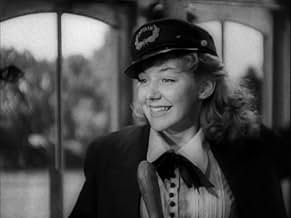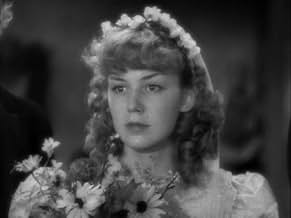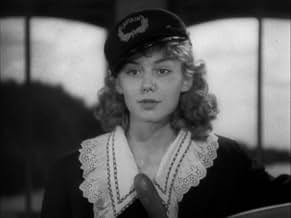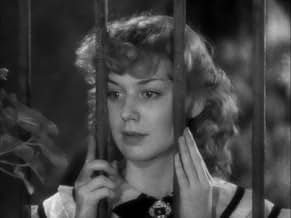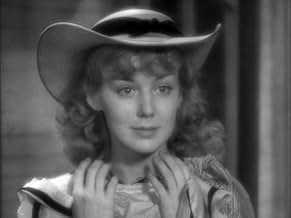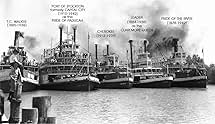IMDb RATING
6.8/10
1.4K
YOUR RATING
A Louisiana con man enters his steamboat into a winner-take-all race with a rival while trying to find a witness to free his nephew, about to be hanged for murder.A Louisiana con man enters his steamboat into a winner-take-all race with a rival while trying to find a witness to free his nephew, about to be hanged for murder.A Louisiana con man enters his steamboat into a winner-take-all race with a rival while trying to find a witness to free his nephew, about to be hanged for murder.
- Director
- Writers
- Stars
- Awards
- 3 wins total
C.E. Anderson
- Jailer
- (uncredited)
Sam Baker
- Undetermined Role
- (uncredited)
William 'Billy' Benedict
- Breck
- (uncredited)
Heinie Conklin
- Jailbird
- (uncredited)
Tex Cooper
- Townsman
- (uncredited)
D'Arcy Corrigan
- Hangman
- (uncredited)
Luke Cosgrave
- Labor Boss
- (uncredited)
- Director
- Writers
- All cast & crew
- Production, box office & more at IMDbPro
Featured reviews
This film debuted just after Will Rogers was tragically killed in a plane crash. Because of this, "Steamboat Round The Bend" is one of the last chances anyone had to see him in film. While it's not among his best films, it's pretty good and well worth seeing.
Rogers plays a 'snake oil' salesman (a guy who sells fake cure-all medicines) has been saving for some time to buy a dilapidated old steamboat. His plan is to run it with his nephew, Duke. However, when Duke arrives, he tells his Uncle that he's just killed a man in self-defense and has brought a woman from the swamps with him. Uncharacteristically, Rogers' character is nasty and voices a strong prejudice against swamp people (no, not the comic book character but people who live in the swamplands). Considering what a nice guy he was in his other films AND his famous quote ("I never met a man I didn't like"), this prejudiced attitude DID seem pretty strange--as did his playing a bit of a swindler.
Fortunately, his character DID improve as the film progressed. Later, instead of hating this girl (Anne Shirley), he felt sorry for her and cared for her when her beloved was jailed for this killing. However, what is Rogers to do--as the Nephew is due to be hung AND he's made a bet to beat a rival captain in the big race? tune in and see for yourself in this gentle slice of Americana.
As I said above, Rogers' character wasn't nearly as sweet as he'd been in other movies. But he was likable enough AND the rest of the cast did a good job--as too often in the past the film was all on Rogers' shoulders--here it's a nice ensemble cast. Berton Churchill (in the weirdest role of his career), Eugene Palette and Steppin Fetchit are on hand to provide some nice support--and Fetchit's a little easier to take as his horrible stereotypical act isn't as obvious and offensive as usual. Overall, well worth seeing.
Rogers plays a 'snake oil' salesman (a guy who sells fake cure-all medicines) has been saving for some time to buy a dilapidated old steamboat. His plan is to run it with his nephew, Duke. However, when Duke arrives, he tells his Uncle that he's just killed a man in self-defense and has brought a woman from the swamps with him. Uncharacteristically, Rogers' character is nasty and voices a strong prejudice against swamp people (no, not the comic book character but people who live in the swamplands). Considering what a nice guy he was in his other films AND his famous quote ("I never met a man I didn't like"), this prejudiced attitude DID seem pretty strange--as did his playing a bit of a swindler.
Fortunately, his character DID improve as the film progressed. Later, instead of hating this girl (Anne Shirley), he felt sorry for her and cared for her when her beloved was jailed for this killing. However, what is Rogers to do--as the Nephew is due to be hung AND he's made a bet to beat a rival captain in the big race? tune in and see for yourself in this gentle slice of Americana.
As I said above, Rogers' character wasn't nearly as sweet as he'd been in other movies. But he was likable enough AND the rest of the cast did a good job--as too often in the past the film was all on Rogers' shoulders--here it's a nice ensemble cast. Berton Churchill (in the weirdest role of his career), Eugene Palette and Steppin Fetchit are on hand to provide some nice support--and Fetchit's a little easier to take as his horrible stereotypical act isn't as obvious and offensive as usual. Overall, well worth seeing.
Snake oil salesman Doctor John Pearly (Will Rogers) makes a bet with Captain Eli to race steamboats. He has to fix up an old steamboat. He hopes to have his nephew Duke as the pilot. Duke brings along swamp gal Fleety Belle who was abused by her family. He had killed a man. It's self-defense but the only witness is preacher The New Moses who has since gone away. Following John's advice, Duke turns himself in. He is set to hang unless the preacher is found.
There is a basic structural issue with the premise and the movie. The movie wants to be a fun, light-weight, silly steamboat race. On the other hand, nephew Duke is threatened with hanging and there is supposed to be danger. These two things often do not mix well together. For example, they need to find The New Moses who is often found on the river. One would expect John to be piloting his steamboat up and down the river spreading the word and looking for the preacher. Instead, he ends up spending his time racing and by happenstance run into the preacher. The race is plenty fun and then we're reminded that Duke is about to be hanged. It's a wacky hanging party.
There is a basic structural issue with the premise and the movie. The movie wants to be a fun, light-weight, silly steamboat race. On the other hand, nephew Duke is threatened with hanging and there is supposed to be danger. These two things often do not mix well together. For example, they need to find The New Moses who is often found on the river. One would expect John to be piloting his steamboat up and down the river spreading the word and looking for the preacher. Instead, he ends up spending his time racing and by happenstance run into the preacher. The race is plenty fun and then we're reminded that Duke is about to be hanged. It's a wacky hanging party.
It's funny to think that when this film was made, it was about a time in the early 1890's, only 35 years earlier than it's production. Now we are looking back almost 75 years at the film itself. I expected a light wacky comedy, but there is definitely a well-rounded plot here revolving around murder in self-defense. Will Rogers gives a very skilled and sympathetic performance, but some of the more hilarious gags in this are gifts from the writers.
The sheriff/preacher's wedding speech goes right up there with Donald Sutherland's in "Little Murders" for sheer comic value.
A great throwaway gag involves the search for the New Moses, when they accidentally run into the New Elijah instead!
Steppin Fetchit, while no great symbol for African Americans, actually plays against his lazy type in this, and his hard work and quick thinking actually save the day on a couple occasions.
A great (and uncommon) saw-playing musical interlude!
To me, the only major weakness was Ms. Shirley as the ingenue. She was quite likable, but did not seem to have lived as hard as her character was supposed to have.
All told, a winner of a film for fans of the 1930's view of the 1890's.
The sheriff/preacher's wedding speech goes right up there with Donald Sutherland's in "Little Murders" for sheer comic value.
A great throwaway gag involves the search for the New Moses, when they accidentally run into the New Elijah instead!
Steppin Fetchit, while no great symbol for African Americans, actually plays against his lazy type in this, and his hard work and quick thinking actually save the day on a couple occasions.
A great (and uncommon) saw-playing musical interlude!
To me, the only major weakness was Ms. Shirley as the ingenue. She was quite likable, but did not seem to have lived as hard as her character was supposed to have.
All told, a winner of a film for fans of the 1930's view of the 1890's.
Endings are important, and even in light comedies with adventure undertones, those endings end up helping to shape everything that came before it. I was a bit flustered by the first hour or so of John Ford's Steamboat Round the Bend, finding things to like but frustrated at the extraordinary loose nature of the telling, but the ending brought everything together in rip-roaring fashion. Will Rogers' final filmed role before his airplane crash that killed him ends up being a fancifully entertaining trip down the Mississippi.
Rogers plays Doctor John Pearly, a conman selling a tonic he says comes from a recipe by Pocahontas herself, but which is literally just rum, to people on the river as he makes his way up to find his own dilapidated riverboat, ready for him to refurbish and put back on the water. When he first arrives at his new home on the river his nephew Duke (John McGuire) arrives with a swamp woman in tow, Fleety Belle (Anne Shirley). Duke had killed Belle's father in an act of self-defense after they had been seeing each other secretly for some time, but the only witness to the events that could possibly clear his name is New Moses (Berton Churchill), a bearded temperance preacher who travels up and down the river, converting wayward souls. However, before anyone can find New Moses, the law arrests Duke, and John forces Belle's family away by lying and saying that Duke and Belle have married.
This was a strong start, and then the movie just kind of begins to flounder for a while. John takes Belle on his refurbished boat up and down the river nominally looking for Old Moses, but they take on a traveling museum of sorts, filling the hold with mannequins of famous historical figures with a lot of talk about how to Americanize the figures to help attract customers. Some small adventures, misunderstandings, and scrapes dominate the middle section of this film around the museum, and while most of it is very lightly amusing, it feels like the movie itself has gotten lost. There's suddenly no urgency about Duke or his plight. It's kind of odd.
After a brief marriage ceremony to make John's lie of Belle and Duke a reality, Duke gets taken down to Baton Rouge for execution. John ends up chasing after Duke and gets caught up in a riverboat race, forced to join as the only way to go further south on the Mississippi and developing a rivalry with Captain Eli (Irvin S. Cobb), pilot of another steamboat. It's here where the movie reclaims its focus and, more entertainingly, a strong sense of energy as the film becomes a race against the clock on two different fronts, the literal race against the other steamboats and the need to get to Baton Rouge before Duke's execution. They may not have much more of a plan than that, but they have to go. In swift order, though, they encounter New Moses preaching on the side of the river, rope him in (literally), and speed off, burning more and more of the riverboat's ephemera to fuel the engines from the lifeboats to, as the race becomes more desperate, the mannequins themselves. Watching New Moses in all of this is a treat, and when he discovers that John has a supply of the Pocahontas cure all on board, also that it's just rum, he has the idea of throwing them in to heat the engine and propel them faster. It's kind of wild stuff, and it's a very fun comedic crescendo for the whole picture.
The film was apparently cut down by about twenty minutes after Will Rogers' death, mostly in the ending, forcing a final shot of Rogers as John reclining on the deck of his boat. It's a nice moment for the character as well as the actor.
This is the first time that Rogers worked with Ford where it felt like Rogers was actually playing a character instead of just himself, and it's a nice change of pace. He doesn't dominate the film like he does in the other two films (Doctor Bull and Judge Priest) to varying degrees of success, allowing the story to play through without completely overrunning everything else. He's the central character for sure, but he allows space for Annie Shirley, as his primary counterpart, to shine in bright and cheerful fashion.
It really could have used a rewrite in its middle section, a section that dragged the film down a good bit, but that ending is really something else, a madcap race with real stakes and cut quickly for an all around good time. It really won me over by the end.
Rogers plays Doctor John Pearly, a conman selling a tonic he says comes from a recipe by Pocahontas herself, but which is literally just rum, to people on the river as he makes his way up to find his own dilapidated riverboat, ready for him to refurbish and put back on the water. When he first arrives at his new home on the river his nephew Duke (John McGuire) arrives with a swamp woman in tow, Fleety Belle (Anne Shirley). Duke had killed Belle's father in an act of self-defense after they had been seeing each other secretly for some time, but the only witness to the events that could possibly clear his name is New Moses (Berton Churchill), a bearded temperance preacher who travels up and down the river, converting wayward souls. However, before anyone can find New Moses, the law arrests Duke, and John forces Belle's family away by lying and saying that Duke and Belle have married.
This was a strong start, and then the movie just kind of begins to flounder for a while. John takes Belle on his refurbished boat up and down the river nominally looking for Old Moses, but they take on a traveling museum of sorts, filling the hold with mannequins of famous historical figures with a lot of talk about how to Americanize the figures to help attract customers. Some small adventures, misunderstandings, and scrapes dominate the middle section of this film around the museum, and while most of it is very lightly amusing, it feels like the movie itself has gotten lost. There's suddenly no urgency about Duke or his plight. It's kind of odd.
After a brief marriage ceremony to make John's lie of Belle and Duke a reality, Duke gets taken down to Baton Rouge for execution. John ends up chasing after Duke and gets caught up in a riverboat race, forced to join as the only way to go further south on the Mississippi and developing a rivalry with Captain Eli (Irvin S. Cobb), pilot of another steamboat. It's here where the movie reclaims its focus and, more entertainingly, a strong sense of energy as the film becomes a race against the clock on two different fronts, the literal race against the other steamboats and the need to get to Baton Rouge before Duke's execution. They may not have much more of a plan than that, but they have to go. In swift order, though, they encounter New Moses preaching on the side of the river, rope him in (literally), and speed off, burning more and more of the riverboat's ephemera to fuel the engines from the lifeboats to, as the race becomes more desperate, the mannequins themselves. Watching New Moses in all of this is a treat, and when he discovers that John has a supply of the Pocahontas cure all on board, also that it's just rum, he has the idea of throwing them in to heat the engine and propel them faster. It's kind of wild stuff, and it's a very fun comedic crescendo for the whole picture.
The film was apparently cut down by about twenty minutes after Will Rogers' death, mostly in the ending, forcing a final shot of Rogers as John reclining on the deck of his boat. It's a nice moment for the character as well as the actor.
This is the first time that Rogers worked with Ford where it felt like Rogers was actually playing a character instead of just himself, and it's a nice change of pace. He doesn't dominate the film like he does in the other two films (Doctor Bull and Judge Priest) to varying degrees of success, allowing the story to play through without completely overrunning everything else. He's the central character for sure, but he allows space for Annie Shirley, as his primary counterpart, to shine in bright and cheerful fashion.
It really could have used a rewrite in its middle section, a section that dragged the film down a good bit, but that ending is really something else, a madcap race with real stakes and cut quickly for an all around good time. It really won me over by the end.
Will Rogers was typical of popular 1930s stars, in that he wasn't a magnificent actor, but he was a great character. No-one wanted pure realism or chameleonic talent from someone like Rogers, just that he be himself in whatever role he assumed. Looking at a selection of his movies, you can see he took on a variety of parts, never literally playing the same person twice. But whether he was a country farmer, a small town doctor or, as here, a steamboat captain, he was always the same Will Rogers; an earthy, warm and trustworthy father figure, gently overseeing the lives and loves of the younger generation with the eye of experience. Such was the strength of his personality that he was able to break out of the character actor bracket and carry a movie on his own as an unconventional but well-loved lead man.
And a Will Rogers picture was typically populated with a fine crop of colourful supporting players. Anne Shirley and John McGuire ostensibly play the romantic leads, but their performances seem drab amid the likes of Eugene Palette and Stepin Fetchit. A few of these co-stars are deserving of special mention. First is Irvin S. Cobb, actually an author with few acting credits, but his cartoonish face makes him a great pompous villain. Then there is Berton Churchill, who normally played rather stern authority figures, here giving us the brilliant creation of a top hat-wearing, cigar-chomping preacher. Churchill's every line and gesture is a hilarious send-up of the type, and his is surely the funniest performance here. And finally we have Francis Ford, brother of director John. Francis played numerous bit parts for his little brother, almost always as a comical drunkard, but this is probably his most prominent performance. Sadly an alcoholic in real life, he does one of the few truly funny drunk acts to be seen in classic Hollywood, and it's lovely to see him getting the chance to shine he deserves.
It's no wonder really that these cheeky character actors come to the fore in Steamboat Round the Bend, because as a director Ford Junior always gave a lot of weight to such smaller players. While he didn't tend to do much screen writing, would often allow the comic relief scenes to play out with adlibbing, or simply hold the camera on the comedy actors for that little bit longer, such as that great shot of Churchill sauntering off after his first meeting with Rogers. Meanwhile he would shoot the more plot-orientated scenes with the minimum of fuss, making them seem brief and hardly relevant. This is not to say that Ford is unable to bring out the deeper emotions of a story. His masterfully economic expression allowed him to keep the human story going during simple exposition. For example, as the McGuire character explains his unintentional killing of a man, Ford keeps Anne Shirley, mutely hunched forward, clear in the background. Another poignant Ford trademark is the heartfelt singsong, in this case "Home Sweet Home" sung by the inmates of a prison. Like the improvised comedy scenes, Ford was willing to linger over sequences like this for the sake of tone over story.
Steamboat Round the Bend is among the best of all Will Rogers pictures, although it is sadly one of the last. By the time it reached theatres the actor had been killed in a plane crash. Still, even if his life hadn't been cut short, the early-to-mid-thirties would probably have been his career peak. The public's love of homely, irregular movie stars that had flourished in the depression was soon to dwindle. The age of such lively character actors was soon coming to an end as well, as audiences wanted more realism and more focused story lines, as opposed to the variety-show style movies that characterised the early talkie era. Still, touches of this older style would continue to crop up, in the pictures of John Ford up until the 1950s, and even today in, say, the Coen Brothers' more oddball productions, and this is very encouraging to see. And yet, nothing can ever replicate the experience of going back to these old classics, an age when personalities ruled the screen.
And a Will Rogers picture was typically populated with a fine crop of colourful supporting players. Anne Shirley and John McGuire ostensibly play the romantic leads, but their performances seem drab amid the likes of Eugene Palette and Stepin Fetchit. A few of these co-stars are deserving of special mention. First is Irvin S. Cobb, actually an author with few acting credits, but his cartoonish face makes him a great pompous villain. Then there is Berton Churchill, who normally played rather stern authority figures, here giving us the brilliant creation of a top hat-wearing, cigar-chomping preacher. Churchill's every line and gesture is a hilarious send-up of the type, and his is surely the funniest performance here. And finally we have Francis Ford, brother of director John. Francis played numerous bit parts for his little brother, almost always as a comical drunkard, but this is probably his most prominent performance. Sadly an alcoholic in real life, he does one of the few truly funny drunk acts to be seen in classic Hollywood, and it's lovely to see him getting the chance to shine he deserves.
It's no wonder really that these cheeky character actors come to the fore in Steamboat Round the Bend, because as a director Ford Junior always gave a lot of weight to such smaller players. While he didn't tend to do much screen writing, would often allow the comic relief scenes to play out with adlibbing, or simply hold the camera on the comedy actors for that little bit longer, such as that great shot of Churchill sauntering off after his first meeting with Rogers. Meanwhile he would shoot the more plot-orientated scenes with the minimum of fuss, making them seem brief and hardly relevant. This is not to say that Ford is unable to bring out the deeper emotions of a story. His masterfully economic expression allowed him to keep the human story going during simple exposition. For example, as the McGuire character explains his unintentional killing of a man, Ford keeps Anne Shirley, mutely hunched forward, clear in the background. Another poignant Ford trademark is the heartfelt singsong, in this case "Home Sweet Home" sung by the inmates of a prison. Like the improvised comedy scenes, Ford was willing to linger over sequences like this for the sake of tone over story.
Steamboat Round the Bend is among the best of all Will Rogers pictures, although it is sadly one of the last. By the time it reached theatres the actor had been killed in a plane crash. Still, even if his life hadn't been cut short, the early-to-mid-thirties would probably have been his career peak. The public's love of homely, irregular movie stars that had flourished in the depression was soon to dwindle. The age of such lively character actors was soon coming to an end as well, as audiences wanted more realism and more focused story lines, as opposed to the variety-show style movies that characterised the early talkie era. Still, touches of this older style would continue to crop up, in the pictures of John Ford up until the 1950s, and even today in, say, the Coen Brothers' more oddball productions, and this is very encouraging to see. And yet, nothing can ever replicate the experience of going back to these old classics, an age when personalities ruled the screen.
Did you know
- TriviaThe film was released shortly after Will Rogers' death on 15 August 1935 from an airplane crash near Point Barrow, Alaska with noted aviator Wiley Post. Originally, the ending of the film had him waving goodbye to the character played by Irvin S. Cobb, but the ending was changed to avoid the audience thinking he was saying goodbye to them, which may have caused them to leave the theater in tears. Cobb urged the ending not be changed. The review which appeared in Variety 25 September 1935 indicated the film had been "announced" as 102 minutes, but had been considerably shortened, which no doubt accounts for some problems in continuity and the abrupt ending.
- GoofsAt the end of the race, an official on a stand is waving a black and white checkered flag. A title card at the beginning of the film states this film is set in the early 1890s. The earliest known use of a checkered flag to signify the end of a race was for the 1906 Vanderbuilt Cup auto race.
- Quotes
New Moses: I've got souls to save.
Doctor John Pearly: No, you got a life to save, and the Lord don't care which one of your jobs you do first.
- ConnectionsFeatured in Directed by John Ford (1971)
- SoundtracksSteamboat Round the Bend
(1935) (uncredited)
Music by Oscar Levant
Lyrics by Sidney Clare
Sung by an unidentified chorus during opening sequence and played during closing credits
- How long is Steamboat Round the Bend?Powered by Alexa
Details
- Release date
- Country of origin
- Language
- Also known as
- Steamboat Bill
- Filming locations
- San Joaquin River, California, USA(River and Delta at Stockton: steam ships, rivers channels)
- Production company
- See more company credits at IMDbPro
- Runtime1 hour 22 minutes
- Color
- Aspect ratio
- 1.37 : 1
Contribute to this page
Suggest an edit or add missing content

Top Gap
By what name was Steamboat Round the Bend (1935) officially released in Canada in English?
Answer
